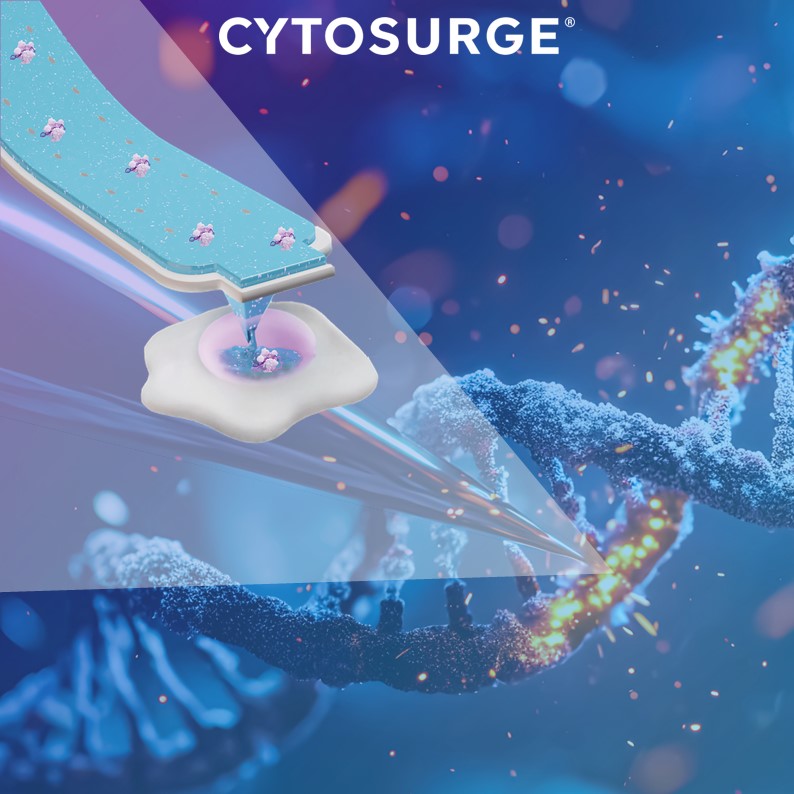- CellEDIT Service represents a novel workflow leveraging FluidFM-mediated intranuclear nanoinjection of CRISPR/Cas9 components into single cells.
- Control of the amount and stoichiometry of RNP complexes could boost efficiency, particularly when targeting multiple loci simultaneously.
- Demonstrated preservation of general cell characteristics and functionality post-editing in both single and multiple KO clones in CHO-K1 cells.
GLATTBRUGG, Switzerland, May 29, 2024", the manuscript introduces CellEDIT as a novel approach to cell engineering that leverages intranuclear delivery of CRISPR components to single cells through Cytosurge's proprietary FluidFM® OMNIUM Platform technology.
The study focuses on Chinese hamster ovary (CHO) cells, widely used in biopharmaceutical production, particularly for monoclonal antibody manufacturing. However, the non-human glycoprofile of CHO-produced antibodies can affect product quality and therapeutic efficacy, posing challenges to traditional glycoengineering approaches due to their time-consuming and labor-intensive nature.
In this proof-of-concept study, Cytosurge's CellEDIT workflow was utilized to engineer CHO cells by delivering CRISPR components simultaneously targeting three genes (BAX, DHFR, and FUT8) directly into single-cell nuclei, resulting in the generation of monoclonal triple knockout CHO-K1 cell lines. Notably, nanoinjection of RNP complexes with FluidFM offered exceptional control over cargo delivery, likely reducing off-target editing and enhancing editing efficiency compared to standard methods.
"In the world of cell engineering, precision is paramount. Our CellEDIT technology, validated in this peer-reviewed publication, offers meticulous control over gene targeting," stated Tobias A. Beyer, PhD, Chief Scientific Officer at Cytosurge and co-author of the publication. "Our CellEDIT Service is already assisting life sciences and biology researchers worldwide by providing high-quality gene editing in cellular models, addressing the growing demand for reliable manufacturing of cell lines."

CellEDIT demonstrated to facilitate the development of both single and multiple KO clones in CHO-K1 cells. Subsequent analyses confirmed targeted genetic disruption and altered protein expression in the knockout CHO-K1 clones, which exhibited sustained gene editing across passages.
"We are proud of this translational research work between our academic lab and Cytosurge as an industry partner. I believe that the blended innovation of intranuclear nanoinjection and CHO cell genetic engineering will pave the way for the rapid generation of advanced biologics," added Justin S. Antony, PhD, Junior Group Leader at the University Children's Hospital of Tübingen and first author of the paper.
"I extend my gratitude to the entire team and the Mezger Lab from the University Children's Hospital Tübingen who contributed to this project," commented Pascal Behr, PhD, Chief Executive Officer at Cytosurge. "Now, we aim to continue applying the CellEDIT workflow to serve researchers and organizations to generate cellular models in fundamental research, disease modeling, and drug discovery to advance scientific research."
"Our collaboration with Cytosurge has yielded exciting results in the realm of cellular engineering," added Markus Mezger, MD, Group Leader at the University Children's Hospital of Tübingen and Lead author of the paper.
Finally, the study demonstrated the compatibility of engineered CHO cells with industry-recommended chemically defined medium and equivalent transgene expression to parental clones.
About Cytosurge
Cytosurge AG is a biotechnology company that develops innovative research solutions based on the FluidFM® technology for high precision single cell manipulation. FluidFM combines microfluidics and force microscopy, which enables gentle interactions with cells. With the capabilities of FluidFM, we seek to advance the comprehension of intricate cellular processes, thus fostering new dimensions in cellular analysis.
CellEDIT Service: high-quality genetically engineered cell lines
The FluidFM CellEDIT Service offers high-quality cell lines for research. In the CellEDIT workflow gene editing reagents are injected directly into the nucleus of single cells. Using the FluidFM technology for intra-nuclear injection, exact amounts of CRISPR RNPs can be delivered to the nucleus of single cells. Thereby edits are introduced with high control and minimal impact on the cells. For more information about the CellEDIT Service Workflow, please visit https://www.cytosurge.com/solutions/services/fluidfm-celledit.
Sequence your cells while keeping them alive with the FluidFM OMNIUM Platform
The single-cell biopsy solution on the FluidFM OMNIUM Platform provides a unique workflow for extracting a part of the cytoplasm from individual living cells while preserving their viability. These cytoplasmic biopsies can be used for subsequent highly sensitive, low-input RNA-seq analysis to characterize single cells multiple times throughout their lifetime. More than 100 researchers worldwide have already chosen to work with the FluidFM technology.
For additional information, please visit www.cytosurge.comand follow us on X, LinkedIn, and Facebookfor updates.
About AG Mezger, University Children's Hospital, Tübingen
Our research lab focuses on developing advanced therapies for different pediatric diseases including ß-hemoglobinopathies, leukemia, lymphoma, glioblastoma, metachromatic leukodystrophy and immunodeficiencies. We have expertise in techniques including CRISPR/Cas9, Prime Editing, viral vectors (AAV & LV), mRNA Therapeutics, Lipid Nanoparticles, Hematopoietic stem cell transplantation, engineered CAR-T cells and engineered NK-cells.
For additional information, please visit https://www.medizin.uni-tuebingen.de/de/das-klinikum/mitarbeiter/profil/582
Contact
Cytosurge AG
Sabina Packeiser, PhD, Head of Marketing
Phone +41 43 544 87 00
Email media@cytosurge.com
A photo accompanying this announcement is available at https://www.globenewswire.com/NewsRoom/AttachmentNg/5095b232-9a7a-4692-8460-c8eec1de59b3

